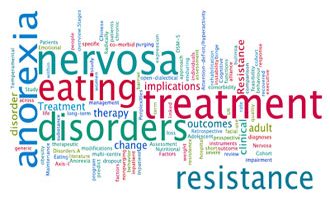One common misconception about bulimia nervosa is that society tends to believe that the people suffering from this disorder can stop by pure will power. As more research has come out this does not appear to be the case. The first step that I feel needs to be explained to better understand the disease is the repetitive cycle that people go through.
Step One: The first step in the cycle is obsessively fixating on food intake and diet. This obsession is usually the result of a lack of comfort with how the body looks.
Step Two: The next step in the cycle is usually starting to control the diet. This control of the diet is usually done by starting a strict or rigid diet that satisfies the desire to only eat “healthy food”. At first glance some one might think that starting a healthy diet is not such a bad thing, but usually for people with bulimia this is not the case. This is because the diet results in food cravings which is the next step in the cycle.
Stop Three: Tension and food cravings is the next step in the cycle. The cause of the tension or the cravings that a person with this disorder will go through is the direct result of the rigid or strict diet. Due to the fact that the majority of the time the diet of choice for a person with bulimia is not actually a healthy one, this will cause the person to have cravings because the body is lacking the required nutrition. The typical response to these food cravings is a slip up and break away from the diet. This slip up is what helps start the next step in the cycle.
Step Four: This step is the planing and ultimately performing a binge. During this first part of the process a lot of people with bulimia will have various forms emotions and anxiety, but the planing of the binge is what helps them cope with their feelings. Once the binge starts it is not uncommon for people to eat 3,000 to 5,000 calories with in an hour. The time between binges will also vary from 1 to 2 times a week in severe cases to a couple of times a week. But this whole binge process is the result of slipping up on the diet and then resulting in feelings of failure and worthlessness.Step Five: This next step is attempting to undo the binge. Undoing the binge can happen in a few different ways, the most coming being purging, excessive exercise, and fasting. The emotions that arise after the binge are what facilitate the undoing. The most common emotion is fear. Most people with bulimia after a binge will be afraid of gaining weight because of the binge and that’s what will drive the undoing.
Step Six: The six and final step is the feeling of shame and disgust. These emotions are just an overall feeling of themselves after they have completed all the previous steps. But The cycle does not just end here, these feelings are now what drive the person to start a new diet and ultimately cause the cycle to repeat all over again.

As one can see emotion plays a huge role in each step of the cycle. People with this disorder go through these emotions constantly but what this cycle is not showing is what is going on inside the body. Research shows that estrogen and serotonin play a huge role in the risk for developing bulimia along with the continuation of the disorder once it has been developed. The impulsive eating style will commonly be associated with estrogen and serotonin levels being out of whack, making it very difficult for a person to control the disease by just pure will power. For both serotonin and estrogen it is very common for people with this disorder to experience low levels of both. Low serotonin levels are often associated with sporadic, uncontrollable emotions and anxiety. While low estrogen levels are associated with some of he impulsiveness displayed in the disorder along with the feeling of being out of control.
So, in the end is this disorder something that someone can just stop by will power? Personally, I don’t think so. I think that the consequences of low levels of estrogen and serotonin are not something that a person can just over power. I believe that the thought of having free will can help someone combat the disorder but this alone will not be enough. But along with this thought of having free will, I think psychiatric help plus medications will drastically help stop the disease and improve life for people who suffer from it.
The Cycle
